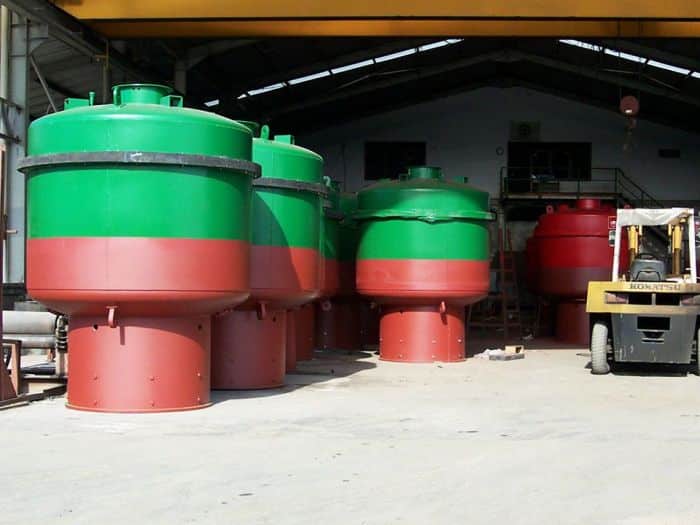How do ships safely move through waterways and avoid dangers? The key is using buoys for navigation, like can buoys. These markers are crucial for safe travel.
These buoys are placed in waterways to mark channels and warn of dangers. They give boaters important info, using colors, numbers, and shapes to communicate.
Table of Contents
Understanding Can Buoys and Their Characteristics
Can buoys are floating markers that help guide ships. They are shaped like cylinders with flat tops. These buoys are anchored to the bottom of waterways, helping ships stay on course.
Definition and Physical Features of Can Buoys
Can buoys stand out because of their shape and flat top. They are made to last in harsh marine conditions.
In addition, they have a strong outer shell and parts inside for buoyancy and stability. They are anchored well, staying in place through currents and weather.
How Can Buoys Differ from Nun Buoys
Can buoys are different from nun buoys, which have a conical top. In the U.S. Aids to Navigation System, can buoys are green with odd numbers. They are on the port side when returning from sea. Nun buoys are red with even numbers and on the starboard side.
This difference is key for safe navigation. Each type has a specific role in marking channels.

Types and Applications of Can Buoys
Can buoys have many uses in maritime navigation. They mark channels, provide regulatory info, and help with mooring. People use these versatile buoys to ensure safe and efficient water travel.
Channel Marker Can Buoys
Channel markers, can buoys are vital for guiding ships through waterways. When returning from sea, green buoys mark the port side of channels. They help boaters stay on course, working with other aids to navigate narrow or dangerous channels.
| Characteristics | Description | Significance |
| Color | Green | Marks the port side of channels |
| Shape | Cylindrical | Easily identifiable |
| Numbering | Odd numbers | Unique identification |
Regulatory Can Buoys
Regulatory can buoys give important info about rules, hazards, or special conditions. White buoys with orange markings are used for this. They use colors, shapes, and symbols to send messages to boaters.
In summary, can buoys are key tools in maritime navigation. They help mark channels, provide regulatory info, and aid in mooring. They are essential for safe and efficient water travel.

Navigational Significance of Can Buoys
Can buoys are more than markers. They are vital to the U.S. Aids to Navigation System. They guide ships through complex waterways, showing safe paths and warning of dangers.
Color Coding and Numbering System
The U.S. has a color coding system for can buoys. Green buoys with odd numbers are on the left side of channels when coming from the sea. This makes it easier for sailors to navigate.
| Buoy Type | Color | Numbering | Side of Channel |
| Can Buoy | Green | Odd Numbers | Port (Left) Side |
Proper Navigation Around Can Buoys
To navigate around can buoys, remember the “Red Right Returning” rule. Keep green buoys on your left side when returning from sea. This rule is key for safe travel in U.S. waters.
Can Buoys in the U.S. Aids to Navigation System
The U.S. Coast Guard manages can buoys as part of a larger system. This system includes other aids like nun buoys and lights. It follows international standards for safe travel.
Understanding can buoys helps vessel operators stay safe and follow rules. We stress their importance in maritime travel and the need for their upkeep and adherence to standards.
Conclusion
There are many other types of buoys besides can buoys. Different types of buoys have different purposes. It is important for mariners to understand the role of these buoys. This can make the maritime business safer and smoother.
FAQ
What is the primary function of Can Buoys in navigation?
Can Buoys mark channels and show safe passage for vessels. They help boaters avoid hazards and navigate waterways.
How do Can Buoys differ from Nun Buoys?
Can Buoys are cylindrical, while Nun Buoys are conical. Their shapes and colors help identify their purpose and safe water direction.
What is the significance of the color and numbering system on Can Buoys?
The color and numbering system on Can Buoys indicate their purpose and safe water direction. For example, green buoys with odd numbers mark the left side of a channel when entering from the sea.

